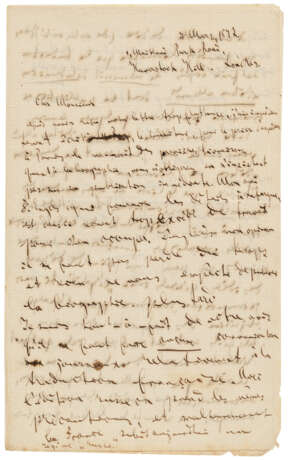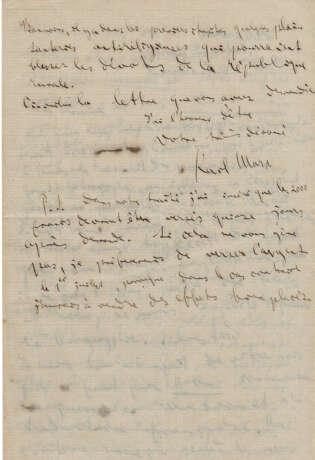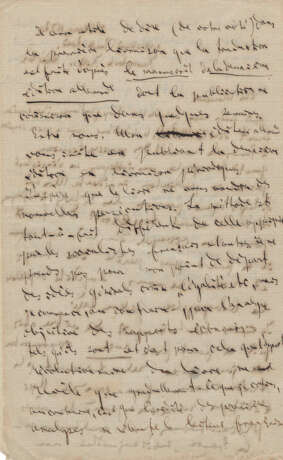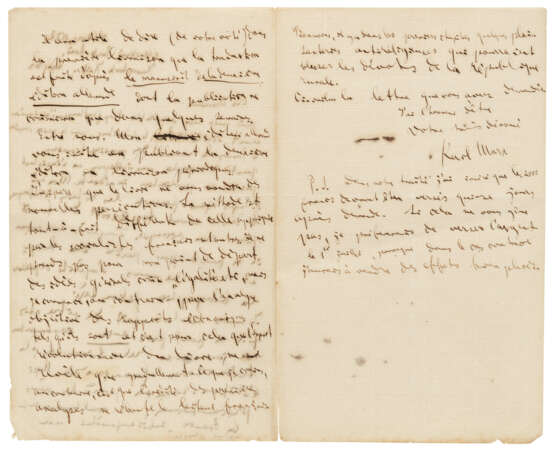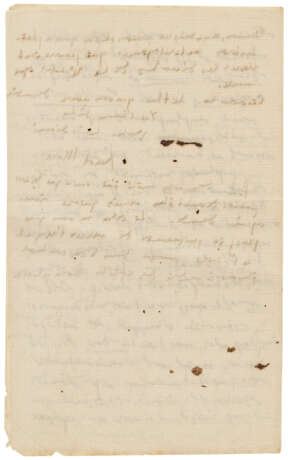ID 993191
Lot 79 | MARX, Karl (1818-1883)
Estimate value
£ 150 000 – 200 000
Autograph letter signed ('Karl Marx') to [Maurice Lachâtre] ('Cher Monsieur'), 1 Maitland Park Road, Haverstock Road, London, 7 March 1872.
In French. Three pages, 210 x 129mm, bifolium, one word ('libraire') cancelled by Marx on p.2 (two words on p.1 affected by ink show-through from the cancellation on p.2, four small chips in the lower margins and the bottom corner of f.1, 2cm split at the base of the bifolium hinge, otherwise in very good condition). Provenance: Maurice Lachâtre (1814-1900); presumably by descent – Ader, 11 December 2018, lot 426, where acquired by the present owner.
On the 'revolutionary spirit' of Das Kapital: an important, long letter from Karl Marx to his French publisher, Maurice Lachâtre, emphasising the original approach underpinning his seminal work - taking economic analysis as a starting point over political theory - expressing his fears that the book will be poorly received in France and mentioning the 'overworked' Engels. 'After receiving your too-flattering letter, I immediately wrote [to Mr Roy], the translator, to ask him to send the manuscript of the first parts of the work to Paris. As for the biography, you will oblige me by not insisting on its immediate publication. My friend F. Engels, who will provide Lafargue with the details, is at the moment too overworked to deal with it. In my opinion, no time should be wasted and there is nothing to prevent you from publishing the biography later. I fully agree with you that no communication should be made to the newspapers about the French translation. The same precautions shall be taken with the Russian edition, and unfortunately France is now under a 'Russian' regime. It will be useful to say (on your end) in the first issue that the translation is based on the manuscript of the second German edition, which will not be published for some weeks. Just between us. My German publisher invites you to publish the second edition as a periodical. I hope that the book will not bring you further persecution. The method is quite different from that applied by the French socialists and others. I do not take as my starting point general ideas such as equality etc., but begin, on the contrary, with the objective analysis of economic relations as they are, and it is for this reason that the revolutionary spirit of the book is only gradually revealed. What I fear, on the contrary, is that the aridity of the first analyses will put off the French reader. Nevertheless, there are some anti-religious jokes in the first chapters which might offend the devotees of the rural republic. Enclosed is the letter you requested'. Marx then adds a post-script on financial matters: 'In our treaty I have inserted that the 2000 francs must be paid within a fortnight of the request. If you don't mind, I would prefer to pay the money on the 1st of July, because otherwise I would have to sell well placed items' [translation]
The first French edition of Das Kapital appeared in parts between August 1872 and May 1875, expanded with hitherto-unpublished material Marx had reserved for the second German edition (published in May 1873). In the Avis au lecteur appended to the edition on 28 April 1875 he emphasised the importance of the French edition, which ‘has a scientific value independent of the original and should be consulted even by readers familiar with the German language’: while the French translator, Joseph Roy, worked initially from the manuscript for the second German edition, Marx was often moved to intervene, revising both works as they progressed towards publication 'to simplify some developments, to complete others, to provide historical or statistical material additions, [and] to add critical insights'. Called the 'crucial, famous, irreversible French edition' by Raya Dunayevskaya (Marxism and Freedom, 1958, p.23), this would be the final edition of Kapital on which Marx himself worked and the text on which later translations were based: Marx died before planned revisions to the German text could be completed, and subsequent editions in German or other languages were prepared by Engels.
The concerns expressed here by Marx regarding the publication of Kapital in France were not without grounds: his fear that the French regime would be unsympathetic proved valid when a judicial administrator appointed by the state to oversee Lachâtre’s affairs sought to postpone the publication of the installments. Marx's relations with Lachâtre were sometimes fraught and it appears that his publisher at first sold copies of the edition hesitantly. Nevertheless, the 'aridity' of the first analyses and the 'anti-religious' jokes did not dissuade the French reading public and when the work was issued as a single book, following the installments between 1872 and 1875, it was with a printing of ten thousand copies, the largest up until then. Furthermore, the Russian edition, which appeared in March 1872, the same month in which the present letter was written, was also well received, in spite of Marx's reservations: 1,000 copies sold in the first two months. Marx also makes reference to a projected biography, noting that Friedrich Engels - who will provide his son-in-law, the Marxist revolutionary Paul Lafargue, with details of the work - is too overworked to deal with it at this moment. Although Engels had by this time retired from business to dedicate himself solely to political endeavours, he increasingly found himself taking over Marx's work as the latter's health declined during the last years of the International Working Men's Association (1864–72) and shouldered increasing responsibility for corresponding with newly-formed socialist parties.
Letters in which Karl Marx discusses the meaning of Das Kapital, his seminal critique of capitalism, are very rare on the market. This is also the longest letter by Marx to come for sale since 2008.
References:
https://imhojournal.org/articles/the-originality-of-marxs-french-edition-of-capital-an-historical-analysis/
| Artist: | Karl Marx (1818 - 1883) |
|---|
| Artist: | Karl Marx (1818 - 1883) |
|---|
| Address of auction |
CHRISTIE'S 8 King Street, St. James's SW1Y 6QT London United Kingdom | |
|---|---|---|
| Preview |
| |
| Phone | +44 (0)20 7839 9060 | |
| Buyer Premium | see on Website | |
| Conditions of purchase | Conditions of purchase |
